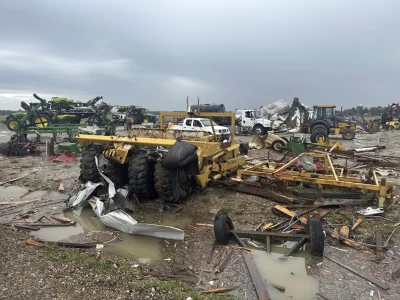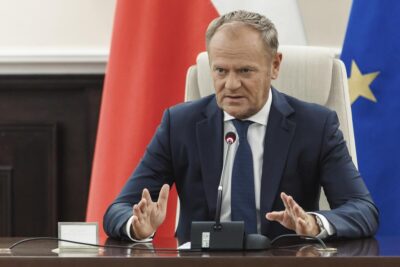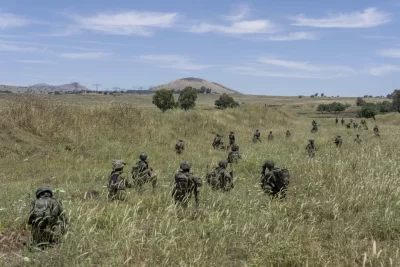
Many poor countries in Africa face the harshest effects of climate change: severe droughts, vicious heat and dry land, but also unpredictable rain and devastating flooding. The shocks worsen conflict and upend livelihoods because many people are farmers — work that is increasingly vulnerable in a warming world.
Climate challenges are at the root of vulnerabilities faced by conflict-ridden countries in Africa’s Sahel region, such as Burkina Faso, Chad, Mali, Niger and northern Nigeria, experts say. Adapting to these challenges could cost up to $50 billion per year, according to the Global Commission on Adaptation, while the International Energy Agency estimates the clean energy transition could cost as much as $190 billion a year — overwhelming costs for Africa.
Countries have limited space in their budgets, and borrowing more to fund climate goals will worsen their considerable debt burdens, argue African leaders, who are seeking a rapid boost in financing.
Some leaders suggested that this week’s meetings of the International Monetary Fund and the World Bank in Marrakech, Morocco, would be “a good place to start” a conversation about Africa’s financial challenges and its ability to handle climate shocks.
It comes amid criticism that the lending institutions are not taking climate change and the vulnerabilities of poor countries enough into account in their funding decisions.
It’s outdated because international financial institutions “are too small and limited to fulfill their mandate. Dysfunctional because the system as a whole is too slow to respond to new challenges, such as climate change. And unjust because it discriminates against poor countries,” the leaders wrote.
In recent years, climate funding to Africa has increased, with recognition that the continent is least responsible for emissions but most at risk from climate change because of a lack of financing and ability to cope. Major development banks have increasingly recognized climate change as an economic threat.
During a panel in Marrakech this week, IMF economist Daniel Lee said the organization is “mainstreaming climate change in policy advice, capacity development and lending.” He did not detail the size or breakdown of funding.
Lee pointed to an IMF program that launched last year to help poor countries address problems like climate change. Only one African country — Rwanda — has gotten financing from the program: $319 million over three years.
Like African leaders, experts say climate financing to the continent has been insufficient and particularly difficult to get for countries in the Sahel that lack stable and recognized governments, with many of them led by military juntas.
“The reality has fallen short of expectations,” said Carlos Lopes, a professor at the Mandela School of Public Governance of the University of Cape Town, South Africa. ”A significant portion of funding goes toward mitigation efforts, while adaptation, a top priority for the continent, receives less attention and support.”
In Niger, whose leader was ousted in a coup in August, as well as northern Nigeria, thousands of hectares of arable land is being lost to soil erosion and dry conditions. It’s led farmers and livestock herders to battle for resources and reduces economic opportunities, helping armed groups recruit, said Idayat Hassan, senior Africa program fellow at the Center for Strategic and International Studies.
Irrigation projects are among the ways to adapt to climate change, but violence is eroding those gains as it leaves farmers, who are already facing lower yields, struggling to access their farmland.
“Apart from extreme heat levels and unpredictable rainfall, insecurity also is affecting us because many times we will not have the chance to go to our farms,” said Ibrahim Audi, 58, a wheat farmer in Nigeria’s far northern Katsina state.
Femi Mimiko, a professor of political economy and international relations at Nigeria’s Obafemi Awolowo University, called the climate money heading to Africa “rather negligible and it is not what we should celebrate at all.”
He added that “the challenges are enormous” because of strict conditions to get IMF and World Bank funding.
Plus, climate financing for Africa needs to address persistent debt crises in many countries, Lopes said.
Africa’s debt repayments are estimated to reach $62 billion this year, exceeding the continent’s costs of adapting to climate change, the African leaders said in their column. They reiterated a call made at the Africa Climate Summit in Kenya last month for a pause on foreign debt repayments.
Another issue is leaders underestimating how climate change feeds violence and economic problems, experts say.
“The national policy to address climate change is lax — little or no focus is on climate change and the nexus between climate change and conflict in the Sahel is underappreciated,” Hassan said. “Go beyond the conflict itself to start prioritizing climate change as the root cause of the problem affecting these countries.”
In Burkina Faso, Mali and Niger, which are all ruled by military juntas, 16 million people need humanitarian assistance, a 172% increase since 2016, and more than 5 million are experiencing high levels of food insecurity, according to the International Rescue Committee.
The humanitarian group blames conflict and climate change for “driving an ever-deeper crisis” affecting agriculture, which is the primary source of livelihood for most of the population in the three military-led countries.
“That fact alone — illegitimate governments — would constrain their ability not just to meet the requirements set by IMF and the World Bank for funding, but indeed, to access such support,” Mimiko said.
“And so, what we must do is to persuade — or arm-twist — the juntas, who at any event have no capacity to run those countries, to commit to what I call, timely redemocratization,” he added.
___
Associated Press climate and environmental coverage receives support from several private foundations. See more about AP’s climate initiative here. The AP is solely responsible for all content.







